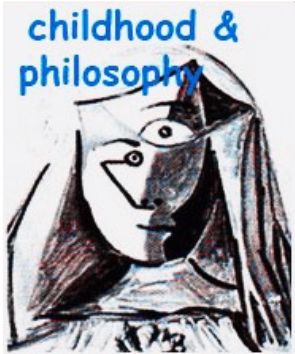philosophy of childhood and children's political participation: poli(s)phonic challenges
DOI:
https://doi.org/10.12957/childphilo.2023.70501Keywords:
philosophy of childhood, listening, political participation of children, poli(s)phoniesAbstract
What challenges does the political participation of children pose to the Philosophy of Childhood? What challenges does the Philosophy of Childhood pose to children's political participation? This text is inspired by the idea that “research is not about enumerating situations, but making researchers lose their sleep”. It is divided into two distinct parts. In the first, we introduce the theoretical framework that orients our research group and our work with children in the philosophical research community. We posit a link between listening to children's voices, the conditions of listening, and the location of their political participation in public space. The second part is comprised of a creative illustrated narrative in the form of a dialogue. From the coast of what could be called the territory of political participation, two characters - Sentinel and Walker - discuss the waves of children that crash onto the territory. To what extent does creating space and time for listening to children open polyphonic movements and enable the construction of new forms of polis: poly(s)phonies? In what ways does the Philosophy of Childhood challenge itself in the creation of poly(s)phonies where the participation of children sets the tone? In what ways does the Philosophy of Childhood in turn challenge us to create poly(s)phonies?
Downloads
References
The United Nations Committee on the Rights of the Child. Convention on the Rights of the Child - General Comment No. 12 The right of the child to be heard (CRC/C/GC/12), United Nations. 2009.
Cruz, A. A Cruzada das Crianças. Alfaguara Portugal. 2015.
Haynes, J.; Murris, K. Opening Up Space for Children’s Thinking and Dialogue. Farhang, 69, p. 175-188 (2009).
Kennedy, David. “Reconstruindo a infância”. A Comunidade da Infância. NEFI Edições, pp. 92-94 (2020).
Kennedy, D.; Bahler, B. Philosophy of Childhood Today. Exploring the Boundaries. London: Lexington Books. 2017.
Kohan, W. “The politics of formation: a critique of philosophy for children”. In Philosophy and Childhood. Critical Perspectives and Affirmative Practices. New York: Palgrave, p. 28-42 (2014).
Lundy, L. “Face to face: children and young people’s right to participate in public decision-making”. In Tali Gal and Benedetta Faedi Duramy (eds). International Perspectives and Empirical Findings on Child Participation: From Social Exclusion to Child-Inclusive Policies, Oxford: Oxford University Press. pp. 357-380 (2015).
Matthews, G. The Philosophy of Childhood. Cambridge: Harvard University Press. 1994.
Murris, K. The posthuman child: Educational transformation through philosophy with picturebooks. Routledge. 2016.
Nishiyama, Kei. "Deliberators, not Future Citizens: Children in Democracy". Journal of Public Deliberation, 13 (1) (2017).
Rollo, T. “Democratic Child’s Play. Natality, Responsible Education, and Decolonial Praxis”. In Thinking, Childhood, and Time. Contemporary Perspectives on the Politics of Education, eds. Walter Omar Kohan and Barbara Weber, London: Lexington Books, pp. 145-160 (2020).
The United Nations. Convention on the Rights of the Child. 1989.
Visniec, Mátei. “Espere o calorão passar”. In: Cuidado com as velhinhas carentes e solitárias. São Paulo: Editora Realizações, pp. 23-28 (2013) .
Webgraphy:
https://www.youtube.com/watch?v=ikN-LGhBawQ, acedido a 9 de setembro de 2022.




